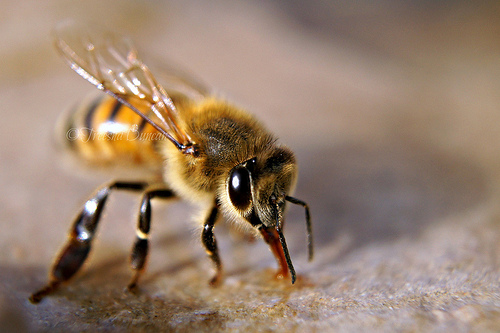Peter Lehner, Executive Director, New York City
I stepped off the train at Grand Central last Thursday, along with tens of thousands of other commuters, and ran right into a lavish display from Bayer, the giant chemical company. Part of the glitzy setup, which took up a good bit of valuable Manhattan real estate, was devoted to bees: how important bees are to agriculture, and how Bayer is helping protect our precious pollinators. I picked up some cute bee-friendly swag–a little toy stuffed bee (conscientiously tagged as not suitable for children under 5), a bee pen, and some beautifully designed informational literature on bee care.
 The literature failed to mention one crucial fact: Bayer makes pesticides that kill bees.
The literature failed to mention one crucial fact: Bayer makes pesticides that kill bees.
Bayer Crop Science manufactures and sells several pesticides from a class known as neonicotinoids, or neonics. They’re the most popular insecticides in the world, and they’re highly toxic to bees. Neonics can kill bees outright, and if worker bees bring toxic pollen from a treated plant back home, they can expose the entire hive to the poison. In lab studies even low doses of neonics made bees disoriented and unable to forage, impaired their immune systems and their ability reproduce.
While the use of neonics has risen rapidly in recent years, so has the body of scientific evidence documenting their toxicity to bees. Scientists have pinpointed neonics as a major contributor to the alarming decline of bee populations worldwide. Last month, in a four-year analysis of the 800 peer-reviewed studies on bees and neonics—including studies conducted by industry players–an international panel of experts concluded that neonics are a key factor in the decline of bees. The European Union has banned neonics for two years.
Yet the literature Bayer distributed to countless thousands at Grand Central contained this outright falsehood: “Neonicotinoids Not Linked to Bee Health Issue.”
Bayer supports its argument by quoting discredited studies, taking clauses out of context, and citing outdated research. This is corporate disinformation at its most brazen.
Despite its protestations of innocence, Bayer is already developing an alternative coating for seeds treated with neonics, since the current application technique can create a lingering, toxic dust cloud that kills bees outright. And Bayer is creating another product it says will protect commercial honeybees from the Varroa mite, a pest that is another possible cause of bee decline.
This tactic won’t help native, wild bumblebees, which sip from the same poisoned flowers as the commercial honeybees used in agriculture, but it’s a wonderfully self-serving solution for Bayer: if honeybees have impaired immune systems because of one Bayer product, the answer is to buy another Bayer product.
The enthusiastic young people handing out Bayer’s bee-friendly freebies seemed unaware of the irony of their position, touting the importance of caring for bees under the banner of a corporation that sells bee-killing products.
Bayer has plenty of resources to devote to its bee-friendly front. And they have time, too, because the EPA’s current plan is to wait another five years before it decides what to do about neonics. This timeline is convenient for pesticide manufacturers, but it may prove to be devastating for bees.
Saving bees means stopping the use of pesticides that are killing them. As bees are the sole pollinators for 71 out of 100 crops that provide the vast majority of the world’s food, a bee crisis is a human crisis, too.
Tell EPA Administrator Gina McCarthy to stand up to corporate pressure and save bees now.








